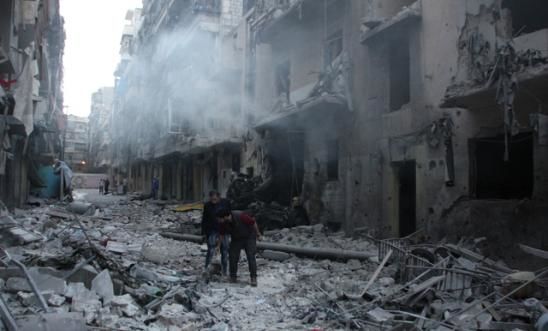
Press releases
Syria: UN Security Council meeting with NGOs tomorrow should lead to arms embargo

‘There are concrete actions the UN can and should take to reduce and deter violations against civilians’ - Philip Luther
United Nations Security Council members should use a meeting with NGOs tomorrow to agree steps they can take to enforce Security Council resolution 2139, calling for an end to indiscriminate and direct attacks against civilians in Syria, said Amnesty International.
The UN “Arria-formula” meeting convened by France and Spain offers a rare opportunity for Security Council members to hear from NGOs who have been documenting the devastating impact of the indiscriminate use of weapons in Syria.
In a report last month, Amnesty highlighted the devastation and horror caused in Aleppo by barrel bombs - unguided, locally-produced explosive bombs dropped by Syrian government helicopters. The report concluded that barrel bombings were part of a widespread attack against the civilian population in furtherance of a state policy and therefore these attacks amount to crimes against humanity. Barrel bombings continue to take place regularly across Syria. Last week barrel bombs destroyed a Médecins Sans Frontières facility at Busra hospital in Dera’a.
Amnesty is urging the Security Council to impose an arms embargo on the Syrian government (it has already imposed arms embargoes on the Islamic State and Jabhat al-Nusra armed groups) and targeted sanctions against individuals on all sides responsible for war crimes and crimes against humanity. Such measures could help end barrel bomb and “hell-canon” attacks against civilians as well as the use of chlorine and other toxic chemicals.
Amnesty is also calling on the Security Council to refer the situation in Syria to the International Criminal Court, something that can provide a measure of justice for victims.
Amnesty International Middle East and North Africa Director Philip Luther said:
“Some Security Council members, UN member states and the UN Special Envoy to Syria have recently been vocal in criticising the indiscriminate use of weapons in Syria, but condemnation is not enough.“There are concrete actions the UN can and should take to reduce and deter violations against civilians.“Russia, which has blocked previous Security Council action against Syrian government violations, supported resolution 2139 and must not stand in the way of enforcing it to protect civilians.”
Resolution 2209
The Security Council should also take further measures to implement resolution 2209 - which was adopted after the Organisation for the Prohibition of Chemical Weapons confirmed that chlorine has been used as a weapon in Syria - in light of the Syrian government’s continued failure to comply with the prohibition on the use of such chemical weapons. The resolution also allows the Security Council to take measures, including economic sanctions and military action, to enforce its resolutions, under Chapter VII of the UN Charter.